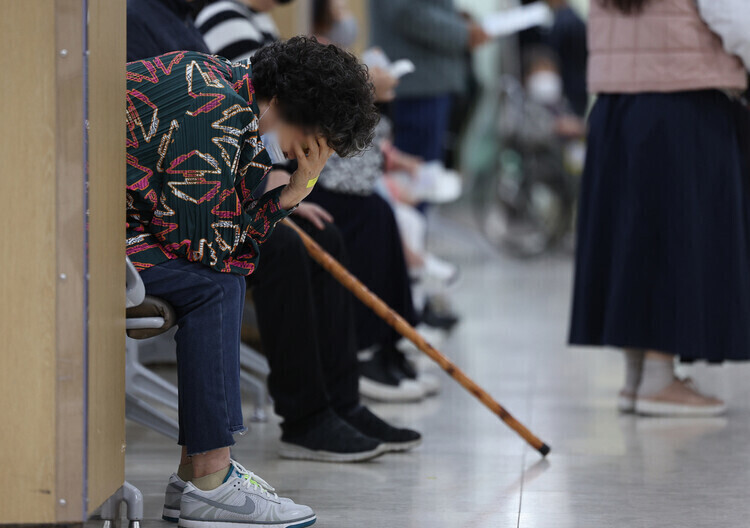hankyoreh
Links to other country sites 다른 나라 사이트 링크
As some doctors plan indefinite walkout, others say they’re putting patients’ lives on the line

“A collective resignation or leave of absence is basically a death sentence for patients in critical condition.”
This is what Hong Seung-bong, the chair of the collective of physicians specializing in epilepsy care, said during a phone call with the Hankyoreh on Sunday. The collective comprises specialists at 18 medical schools nationwide. Members of the group have decided not to partake in the collective leave of absence declared by the Korean Medical Association, which is scheduled to begin on Tuesday.
“Collective resignations or leaves of absence are ultimately the individual decisions of my fellow doctors, but as a doctor, as a Korean citizen, it’s a decision I absolutely cannot agree with,” said Hong.
“Is the effort to prevent increasing the annual medical school admissions quota by 1,509 people more important than saving patients’ lives?”
“How could you say that an annual increase of 1% in the number of doctors nationwide will wreck the health care industry?” he continued.
“Patients die because of a lack of doctors. In no country do you have a situation where patients die because of too many doctors,” he said.
“Endangering the lives of tens of thousands of critically ill patients to prevent an increase in the number of doctors 10 years down the road is unacceptable. As a doctor, you are obliged by the Hippocratic oath.”
According to Hong, medical interns and residents abandoning their posts have resulted in epilepsy patients being unable to receive surgery, which can be a question of life or death. Epilepsy is a condition in which the temporary malfunctions of brain cells result in seizures.
“People suffering from epilepsy often burn themselves while boiling water and fall down stairs. Many injuries come from simple everyday activities,” Hong said.
“As a doctor who sees such patients every day, I can say that the current medical vacuum cannot continue,” he said.
“Epilepsy patients are 30 times more likely to experience a sudden and unexpected death. Even young patients suffering from intractable epilepsy die from seizure-related accidents at a rate of one to two persons per day,” he went on.
“Operations greatly reduce the probability of death and double the chances of survival.”

An increasing number of epilepsy patients urgently require surgical operations. Yet interns and residents have left teaching hospitals, leaving shortages in anesthesiologists that then have negative ramifications for the number of surgeries that can be scheduled, according to Hong.
“As a result of the shortage of anesthesiologists, we cannot even perform 40% of the epilepsy operations that have been scheduled. Canceling an operation is like handing a death sentence to a patient,” he said.
If medical professors go on strike, current staff shortages could become drastically worse, Hong said. The emergency policy committees of the faculty associations of Seoul National University Hospital and SNU College of Medicine went on strike on Monday. As of Sunday, 62.7% of scheduled surgical operations were expected to take place. This figure is expected to plummet down to 33.5%, although hospitals claim that critical and ER operations will continue.
“Even now, epilepsy and cancer patients are having their operations canceled or delayed indefinitely,” Hong said.
“Professors going on strike reduces the number of operations. How do they expect to continue operations for critical patients?”
“Patient guardians are coming to me, telling me that patients are dying. They keep telling me that all they need is an anesthesiologist, and a professor can perform the operation. If the interns and residents do not come back to their posts, we need to consider bringing in anesthesiologists and doctors from abroad to solve this issue immediately,” Hong said.
Hong once again stated that interns, residents and professors need to return to their posts immediately.
“If you want to call for a change in public policy, do it in a way that does not threaten the lives of critically ill patients. If patients die as a result of your walkout or resignation, it doesn’t matter what the cause is. It cannot be justified.”
By Kim Yoon-ju, staff reporter
Please direct questions or comments to [english@hani.co.kr]

Editorial・opinion
![[Editorial] Exploiting foreign domestic workers won’t solve Korea’s birth rate problem [Editorial] Exploiting foreign domestic workers won’t solve Korea’s birth rate problem](https://flexible.img.hani.co.kr/flexible/normal/500/300/imgdb/original/2024/0626/5517193887628759.jpg) [Editorial] Exploiting foreign domestic workers won’t solve Korea’s birth rate problem
[Editorial] Exploiting foreign domestic workers won’t solve Korea’s birth rate problem![[Column] Kim and Putin’s new world order [Column] Kim and Putin’s new world order](https://flexible.img.hani.co.kr/flexible/normal/500/300/imgdb/original/2024/0625/9617193034806503.jpg) [Column] Kim and Putin’s new world order
[Column] Kim and Putin’s new world order- [Editorial] Workplace hazards can be prevented — why weren’t they this time?
- [Editorial] Seoul failed to use diplomacy with Moscow — now it’s resorting to threats
- [Column] Balloons, drones, wiretapping… Yongsan’s got it all!
- [Editorial] It’s time for us all to rethink our approach to North Korea
- [Column] Why empty gestures matter more than ever
- [Editorial] Seoul’s part in N. Korea, Russia upgrading ties to a ‘strategic partnership’
- [Column] The tragedy of Korea’s perpetually self-sabotaging diplomacy with Japan
- [Column] Moon Jae-in’s defense doublethink
Most viewed articles
- 1Blaze at lithium battery plant in Korea leaves over 20 dead
- 2CIA record confirms US ‘completely destroyed’ Seoul’s Haebangchon in 1950 bombardment
- 3How sanctions are backfiring to fuel a new Eurasian alliance
- 4How 17 km of river could be a fertile bed for NK-China-Russia cooperation
- 5[Column] Kim and Putin’s new world order
- 6Dispatched into unknown danger, foreign day laborers were defenseless against blaze
- 7[Editorial] Workplace hazards can be prevented — why weren’t they this time?
- 8What made Korea’s lithium battery plant fire so deadly
- 9Foreign day laborers make up majority of death toll in Korean battery factory fire
- 10[Editorial] Exploiting foreign domestic workers won’t solve Korea’s birth rate problem